Things come easily to the Spiritfarer because everything they do is to help others. This utterly marvelous game charges you with the most precious of cargo: spirits making their last pass through a fantastical world between ours and the next. As the Spiritfarer, it's your duty to aid these souls in their final moments before crossing into eternity. That duty quickly becomes a pleasure as every inch of this spirit world unfolds into joy and wonder. For a game all about death and letting go, Spiritfarer is joyous, full of light and life, while still remaining impossibly true to its raison d'être.
Spiritfarer is a 2D platformer with a heavy dose of crafting and management. Your job is to sail the oceans, visiting islands, landmarks, and anomalies to gather and expand your abilities by finding shops, resources, and even ability-granting shrines. Your life as the Spiritfarer is not just a simple ferryman for wayward souls. Instead, you're there to help. It's more than just listening to tales of past lives and learning about your guests--they have needs to be fulfilled before they can move on, too.
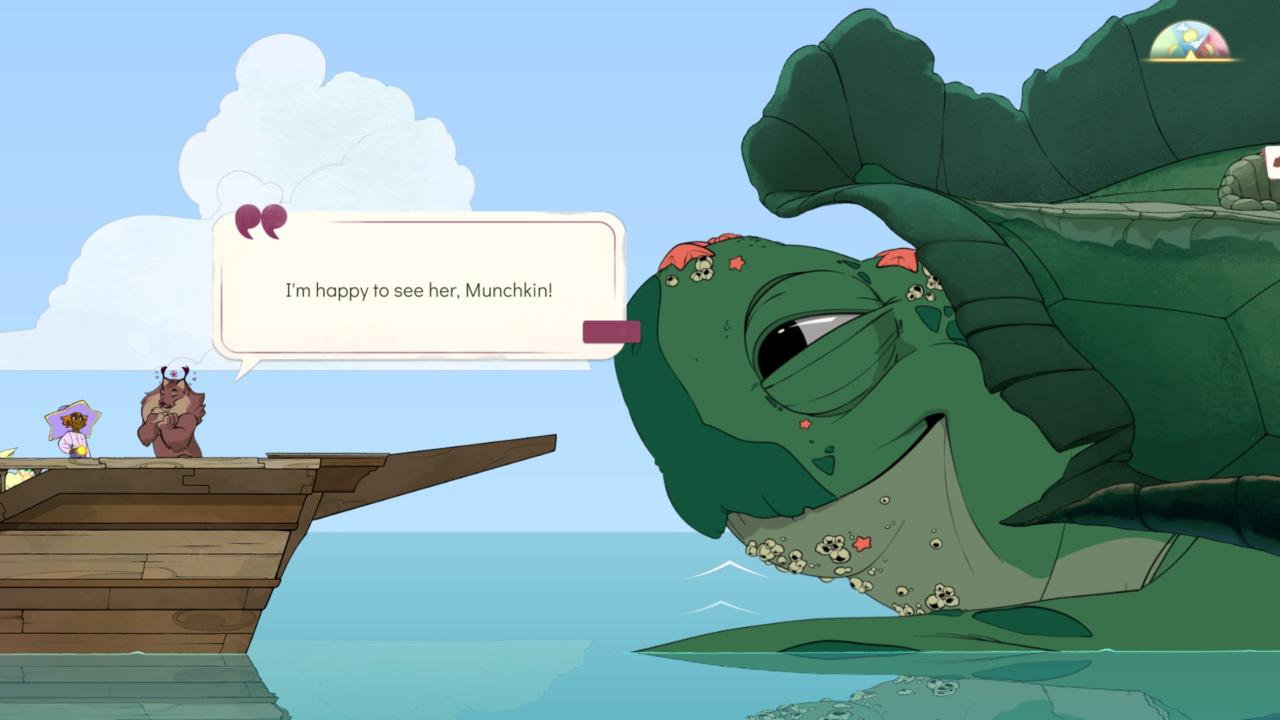
Some may want to eat certain foods to reminisce, and you'll need to discover the ingredients and recipes to cook for them. Others may want to visit places that spark their imagination, or even just learn how to be comfortable on their own. The knowledge and materials you bring back to your ship will help to expand your enterprise. You'll create a temporary home for the spirits that choose to join you, caring for their every need while strengthening your ability to make these journeys possible, so that when their final one comes, you'll be ready too.
There are a lot of moving parts to this adventure. Thankfully, Spiritfarer smartly condenses its multitude of tools into the handy Everlight--a sort of ethereal Swiss Army Knife. This glowing pendant adorns both the protagonist character Stella and her cat Daffodil (who's playable in co-op) and morphs contextually so you can complete a wide variety of tasks. You're never without it and it doesn't break--the Everlight is present in everything you do, and its magic makes everything a breeze. It eliminates the busywork of switching and maintaining tools found in other management games, and despite this consolidation, every Everlight action still feels unique.
Releasing a perfectly timed long-press to achieve mining feels distinctly different from the back-and-forth thumbstick motions to saw down a tree or the single tap of a button to water a plant. This applies to using crafting facilities, too. The longer held press of the loom is distinctly different from mashing buttons on the crusher. Even working with different materials within the workshops will feel distinct, like metals needing to be held at specific heating points while smelting. There's a beautiful mix of ease and variety that keeps repetitive actions from feeling dull and even makes you feel more involved. I genuinely enjoyed performing all these little menial tasks throughout my entire playthrough, which is a small miracle.
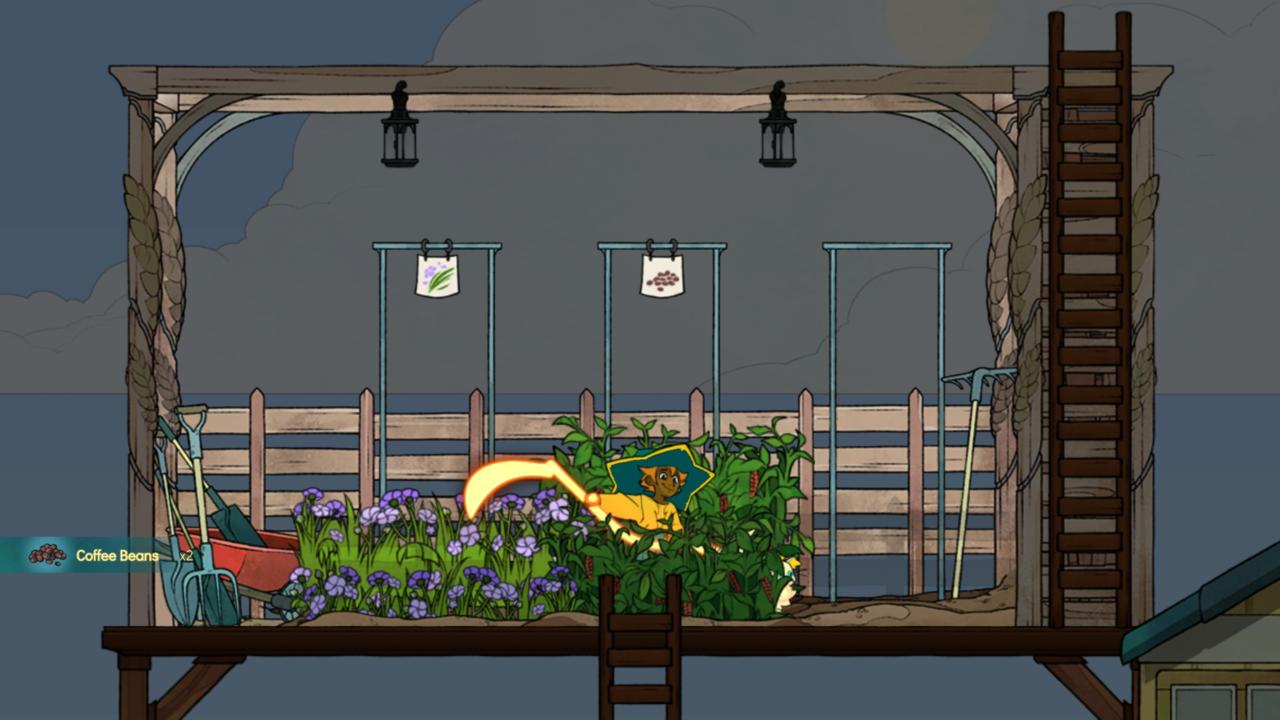
The loop of finding resources then bringing them to your facilities to make things is infinitely rewarding. Finding a new food ingredient was like discovering a world of opportunities and had me excited about the new dishes I could make. A new ore discovery could unlock the potential for new buildings, and new buildings might, in turn, let me change that ore into something new again. Spiritfarer even allows room for creative experimentation--for anyone who's ever really wondered what might happen if you place an old boot in a smelter, or wanted to loom metals, the game has you covered in a whimsical and wonderful way. You feel like there's always a little more to discover throughout the entire duration of the game, but not so much that you won't lose your satisfying sense of mastery of these materials and how to get the most out of them.
As your abilities and resources grow, your ship will reflect that. Homes will be built to shelter the various souls you've touched, and you'll also see kitchens, gardens, looms, and all sorts of other utilities. As you upgrade, you can place new buildings virtually anywhere on your ship, meaning orchards can sit high up on stilts and houses can be stacked on top of each other, with myriad ladders reaching to the sky all atop your deck. The result is a delightful vessel that always feels like something uniquely yours. Because I placed (and sometimes moved and replaced) every element on the ship, I was able to internalise it and make my way around like I actually lived there. Helpfully, every building is instantly recognisable, and later, I was able to add traversal elements like zip lines and bounce pads, letting me swing around my floating refuge with great efficiency and genuine joy.
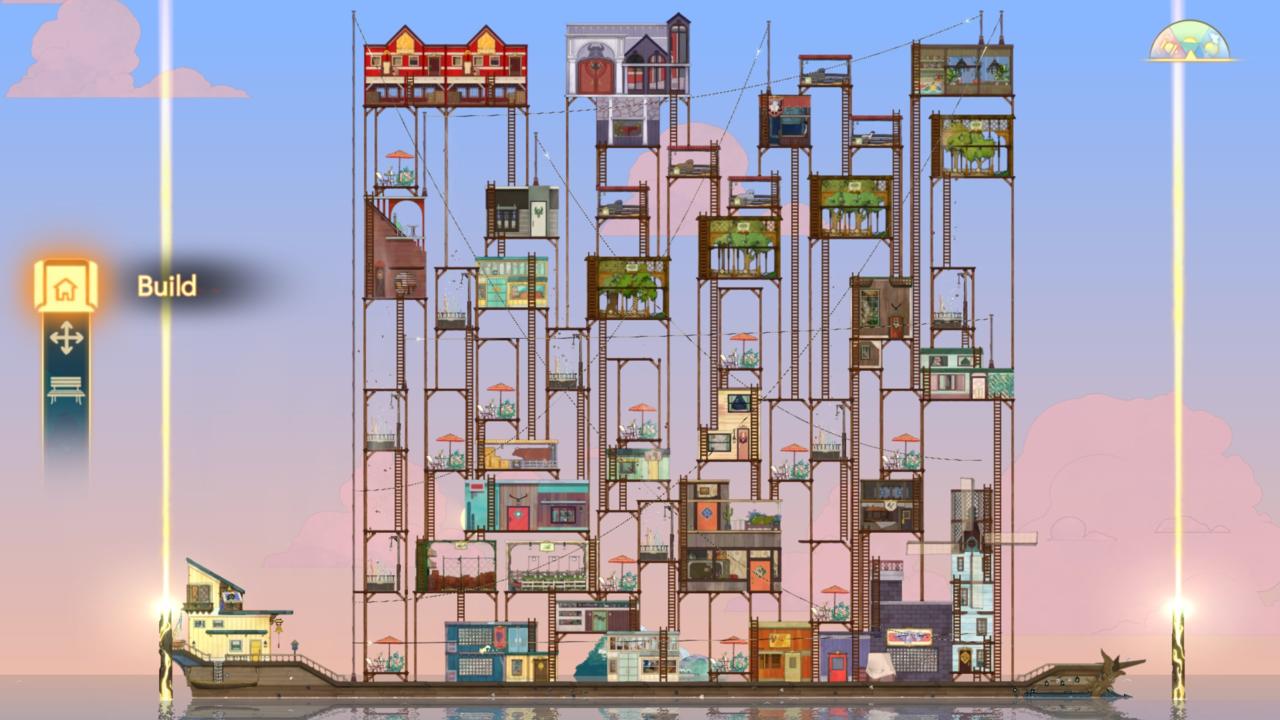
A lot of that joy comes from Spiritfarer's platforming dynamics, which are light, bouncy, and fluid. Movement feels wonderful and only gets better the more you become accustomed to it. Damage or dying in the traditional video game way isn't an issue, so there's always a sense of safety that lets you experiment, and difficulty in platforming challenges is usually dependent upon your skill in pulling off a series of moves (and will almost certainly be optional). New moves are unlocked by finding shrines, but not all are mandatory to finish the game. That said, every new skill adds to the repertoire of how smoothly you can get around, and chaining together abilities like bounces, ziplines, glides, and dashes is bliss. There’s such a good sense of flow--it feels natural to use all the tools in your movement arsenal even when they’re not strictly required. Being able to move quickly and with such whimsy in a game where you constantly dart from one building to the next also helps to really break up the strict mechanical actions of the Everlight with something more freeform and flowing. The smooth, hand-drawn animations also do a lot to make the movement absolutely thrilling. I adored revisiting locations with new powers to find additional secrets, even when I didn't have to, just to see how quickly I could zoom through an area.
This care you're asked to give the wayward souls is reflected back beautifully in the game's design in that I, as a player, also felt cared for. Everything you do in Spirtfarer feels effortless, like a lucid dream where things can only go your way. Stakes are low; no one can ever come to harm and every bit of progress only makes life better for someone. It's evident in so many little choices, like the way the roof of your boat's cabin slants back inwards, preventing an overzealous platformer from falling overboard. If you choose to purposely jump off, the boat merely stops and waits. There's no damage, no time limit, and no fear--except the fear of saying goodbye, a theme that’s handled with expert care.
You'll spend a lot of time on your ship sailing to and exploring the new islands, which is how you find the spirits in need of your services. Not only do these spirits take up a temporary home on your boat where you can interact with and generally enjoy their company, but they also impart some wisdom to help you improve. In addition to assisting with learning new tools, they may offer other perks. They may help with general maintenance, give you items, or just make life more pleasant--some will play music when happy, which in turn raises the spirits of the others aboard. After all, being around uplifting people tends to be contagious.
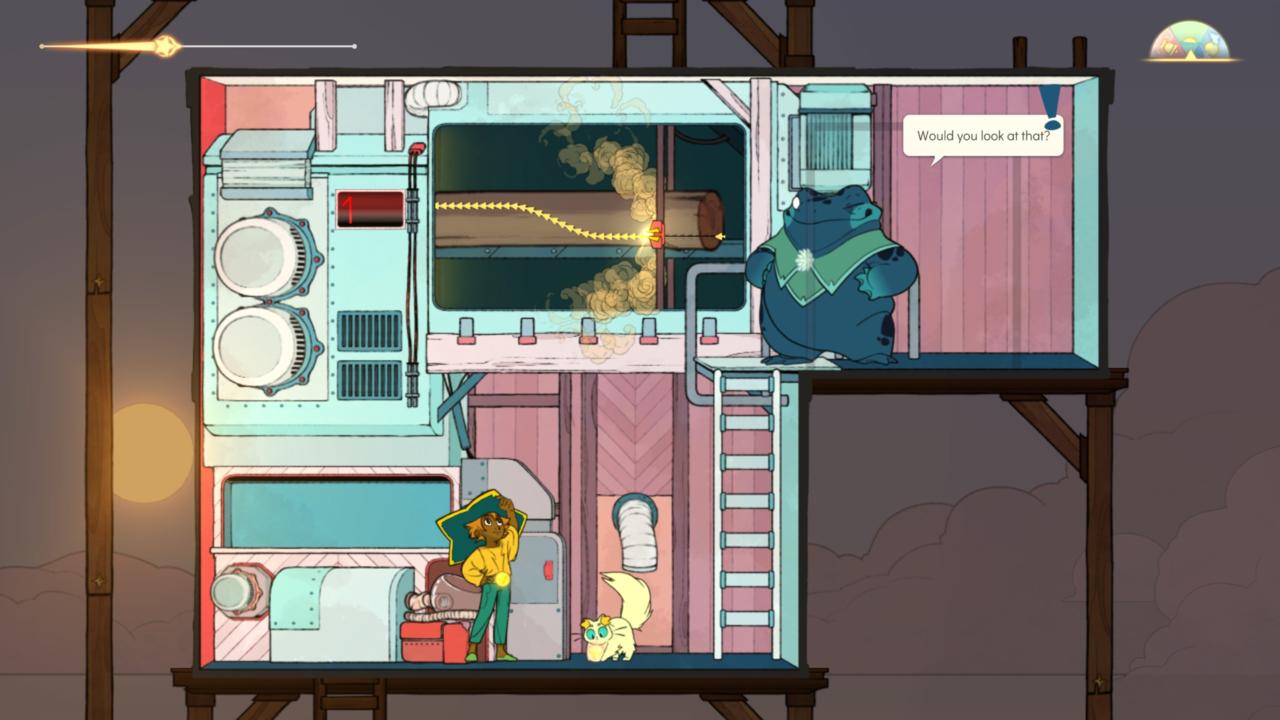
But the spirits themselves are more than just helpful tools and resource nodes; they're genuinely interesting characters, too. Most are familiar from the protagonist's life--many know and have stories of Stella, some are even related, while others just seem to know her warmth. Each is their own unique person, and though I didn't like some characters as much as others, I still came to empathise with their stories. They're all souls, dealing with the understanding that things must end, and they all handle it differently.
One character is burdened with the guilt of not being sad over a toxic family member's death, which resonated powerfully with me. Others reminded me of people I knew, or people I wished I knew, like a loving uncle who just wants everyone to have a great meal. One thing they all have in common is an excellent visual design that reminded me of the wholesome and comforting cartoons and books from my childhood. Each character also has an impossibly warm hugging animation completely personable to their design; there are just so many flavours of love and grief that even as someone who often feels like an outcast in such matters, I found a lot of common ground.
It's surprisingly poignant how every character eventually realises that their time is up. There's a place of peace and acceptance they each come to, even though they may not want to. The overarching theme is that everyone has a time and that it's okay. The lives they lived were theirs, and they may have been painful, joyous, or even unfulfilling. Spiritfarer suggests it's not about seeing the good in our journeys over the bad, but about seeing the journeys as ours. Our lives are stories written just for us to do with the best we can, whatever that may be, then to see our time as over and find contentment in the relief that comes with letting go.
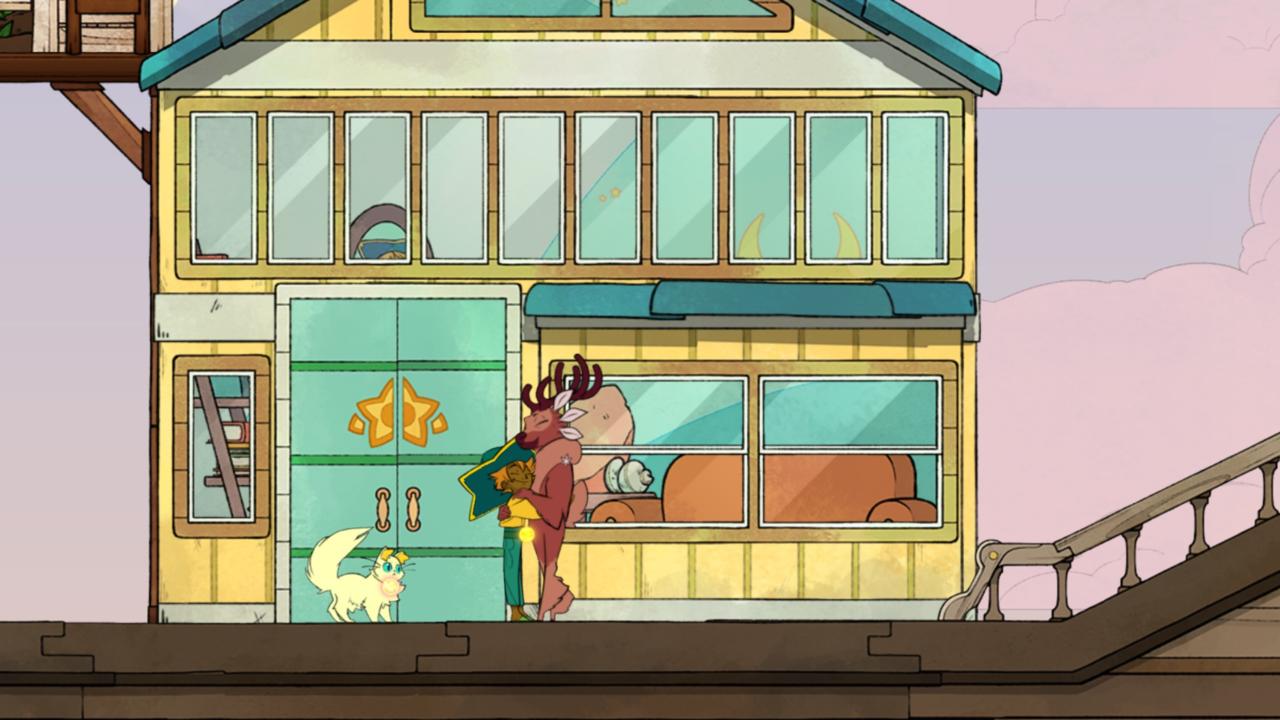
The genius of Spiritfarer's masterful approach in embodying these themes became very apparent when I started feeling it myself. My ship was fairly empty and I had begun to feel the absence of my passengers. My task list was low, and I'd visited every corner of this interesting world. I could feel my time was coming to an end, just like the journeys of every spirit I'd helped so far. I had the ability to end my game, complete my final mission, but I also wasn't ready--so I managed to scour for a final few things to do. These late-game missions felt perfectly timed. They were definitely built to test my crafting knowledge and platforming abilities, and they gave me a few more hours at the end that made me feel like I'd really mastered this world. Spiritfarer was giving me my last hurrah, just as I had done for the spirits who needed my help. Then I was ready. After 37 hours, many of which were dangerously consecutive, I finally let go.
Spiritfarer is somehow a game with no risk but all reward. There's no death, no pain, no rush on any task, and yet I don't think I've ever felt this complete. You're allowed to totally take your time, play on your own terms, and even though your tasks are easy, they are incredibly fulfilling. If the game had kept giving me quests, I feel as if I would have kept doing them for eternity, just because I wanted to. All of Spiritfarer's novel mechanical variations kept potentially repetitive actions from ever growing old. Its gleeful little islands got more exciting to explore as new platforming abilities were unlocked. The characters, even small ones with funny little quips of dialogue that you encounter, were friends that I cherished. I absolutely adored existing in Spiritfarer's beautifully animated, compassionate world so much that it genuinely came to feel like home.





























